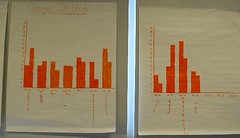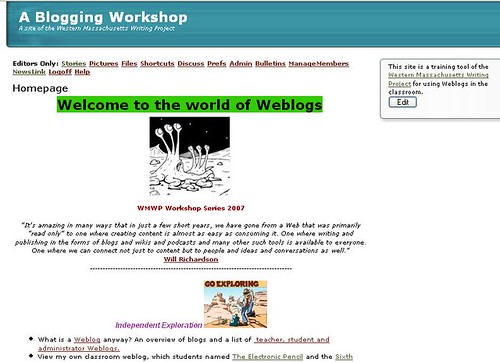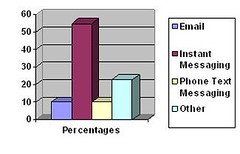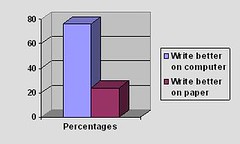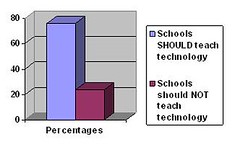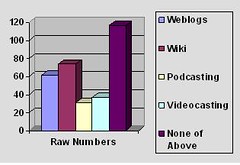I am project leader for an initiative (funded by the National Writing Project) that seeks to use weblogs to connect students. We have 15 teachers from five school districts, and about 300 students using blogs to write and interact.

We just finished the first phase of our project, in which students introduce themselves and comment with each other. We have had almost 1,200 posts on the Manila-based Weblog that we are using (the poor server). This weekend, the teachers all met to talk about how things are going. For the most part, they are not technology-proficient, so this project is pushing them in new, and sometimes frustrating, directions.
Here are some of the teacher posts from this weekend:
“Most students from Southampton have made their introductions and have had had a chance to go back on and make comments to introductions of students from other schools. This went very smoothly in Southampton. Many responses were made to students from other towns. We did tell all students to make at least 3 responses to students from OTHER schools first before responding to someone from our own school. We also reminded them to look for studentsto respond to who might not have any responses yet. One frustration some students had was that they did not know who had responded to their introduction. If there was more than one student with the name “Bob”, for instance, they did not know which one in order to respond back to him. Or, students were not signing their response.” — Lisa
“The successes include seeing all of the connections that students are making as well as seeing the empathy being gained as they learn that other student are having shared experiences. Hinting about the upcoming experiement has also been a real postitive as students witness the nature of science as others repeat the Skittles experiment to gather more data.“ — Jack
“Everything is going okay so far. The only problem we have had has been gremlins in the machine that won’t accept the kids’ passwords or even their existence as members when they try to log on. The weird thing is that on any given day some kids get on successfully while others do not. There seems to be no consistency in who the particular victims will be – someone may have no problem one day, but may have to try 2 or 3 times to get logged in the next day.” — Mary M.
“I was a little disappointed in my students’ introductions, but I think that as soon as they see the traffic that has hit the blog, they will become more enthusiastic. Right now, like me, I think they are a little overwhelmed.“ — Denise
” Our students created self-portraits by hand. We took digital pictures of them and then uploaded them to a photo storage website. The only pitfall was figuring out how to do all of this–trial by fire and LOTS of time. If anyone needs help with this, thanks to just-in-time learning, I am now a Master Jedi. LOL” — Michele
“One problem I ran into was that some students would hop on the blog whenever they got a few extra minutes in the day. They were able to get their work finished quickly; posting their own and responding back and forth to several people. This was great, but the problem was that with the extra time, they just started to casually blog to one another. I had to have the “this is not myspace” talk with them and remind them that all of the other people and teachers on the blog can and would be reading what they write.” — Deb
“I’m benefitting because I’m gaining some technological skills. My students are improving both their writing and technological skills, and they’re making meaningful connections with students from other communities. I think my students especially enjoyed posting their self-portraits – Michele, who is a technology wizard, helped a great deal with this. The drawings don’t really look like them, but they capture their personalities quite well! One thing I really like about this project is the security of the site and the control we have as teachers. ” — Paula
“Many of the students are excited about the project and are looking forward to continuing. It is sometimes difficult to manage all the students as they are not very independent when starting a new endeavor. We are ironing out the wrinkles as far as logistics, scheduling, and other problems go. ” Ann
“Things are going well, slow but sure. My fifth grade students are enjoying this ‘new’ way of talking, especially the relaxed writing style. It was refreshing to see some of my more reluctant participants jump on the tech train. I am wondering how I can keep this same enthusiaism as we try to find time and space in the computer lab. The chatter is great. Kidos want to get on and talk with each other. I have one student who got onto the site from home. I’m not sure about this…I wonder how I can control what happens outside my perview? I have a new layer of responsibility that I’m not yet sure about.” — Mary F.
“I have a group of enthusiastic bloggers this year. Although they are not as advanced with technology as my group last year, they are tenacious.” — Eva
“It has been difficult for us to “squeeze” the blogging into our curriculum, but the kids are enthusiastic and most want to do more. It’s interesting how these kids perceive the responses they have been getting – some were disappointed to find out that they were corresponding with “white kids”, and others were disappointed to have responses from younger students “Miss, why are you trying to “hook me up” with a 10 year old!” But, it’s good for them to see outside of their culture and very limited horizon. And once they began to understand everything, they were accepting and look forward to the experience.” — Wendy
“Again, I’m having trouble when I really wasn’t expecting to. I planned to blog with a class that I had a support teacher with and that is usually a pretty enthusiastic bunch, the principal had been notified and seemed to be on board, etc., and Wendy said she would help if I needed her. Then- My support teacher and Wendy were assigned to new Lindamood Bell classes during that block, the principal got MCAS panic, and my class, for the most part,decided they are not that interested!” — Mary D.
So, as you can see, there is a lot of reflection going on with the project, and many hurdles to overcome. In the next day or two, I will share the data from a survey we had our students take around technology.
Peace (with connections),
Kevin


